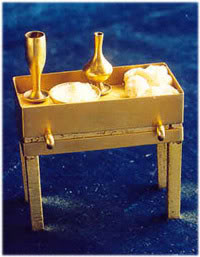On Corpus Christi, Before the Blessed Sacrament
You languish in the darkness like
a criminal imprisoned
a sick man quarantined
an eccentric, babbling uncle, hid away.
Are they so afraid of You?
Are we so ashamed of You?
This is Your pageant day!
Where are Your holy calvacades?
Your solemn ranks of soldiers
with their Captain at their head?
Your festal, fair procession
winding through the curious crowds
who marvel at the sacred spectacle?
In the quiet I hear echoes
from the stones of ancient streets
crying out with praise to shame us
for our silence.
In the blackness I see faces
of a multitude of children
looking down the ages, wondering
to see so plain a feast.
For the glory due Your name,
how long, O Lord,
must You wait?
~Paul Thigpen


